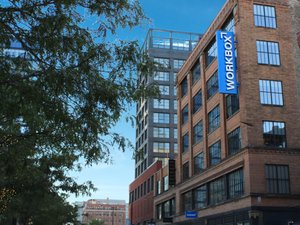Every startup has a founding story. For John Haskell, his company was inspired by a friend at Stanford who struggled with substance abuse and nearly took her life.
Haskell's friend, battling issues with mental health and addiction, reached her breaking point. She no longer wanted to continue with treatment, and was ready to end her life. But on the very day she contemplated suicide, she got a call from her mother. The communication ultimately saved her life, Haskell explained, all because she knew something wasn't right with her daughter.
It's this "motherly intuition" that Haskell wants to bring to more victims of substance abuse through his new startup Triggr Health, a predictive analytics app that uses someone's phone behavior to determine when a person is likely to relapse. Triggr knows a person's normal habits, looks for behavior that might be out of the ordinary--like a change in location, sleep patterns, and even how much a person is texting or playing Words With Friends--and the startup can proactively reach out to provide support.
Triggr says it can predict with over 92% accuracy three days before a person slips in their recovery.
"Intuition, generally, is purely a data question," Haskell said. "It's subconsciously understanding patterns ... We understand someone's deviations from those patterns to understand their wellbeing."
Triggr's machine learning algorithm measures a person's sleep history, call logs, texting history and general smartphone usage, and its platform alerts the Triggr team if someone is deviating from their normal behavior. Triggr can then reach out via phone, text or in-app message to help get the person the help they need in real time.
Triggr is taking an ambitious approach at a crisis that has ravaged the United States. In 2015, over 27 million people misused prescription or illicit drugs, and over 66 million people reported an unhealthy level of drinking. Illicit drug use and alcohol abuse cost the country hundreds of billions annually.
Triggr says that its predictive analytics, combined with the ability to 24/7 proactively connect with people struggling with recovery, is three times more effective than traditional treatment models.
"What we can predict, and what can we build from a care model perspective, is exponentially more effective than traditional treatment," Haskell said.
Founded in 2014, Triggr has a team of nearly 20 people, many of which are ex-Google engineers, Haskell said. The startup has kept a low profile as it's worked to develop its tech and partner with healthcare providers, and it has raised $4.2 million in funding from Ohio-based Drive Capital. Haskell said Triggr has worked with over 100 providers across the country, making its app available to thousands of people dealing with addiction.
Haskell came to Chicago after graduating from Stanford to join startup GiveForward, but left to start Triggr a year later.
"Chicago is an incredible place to build a company focused on not just growth, but also how do you have an incredibly high social impact in the real world," he said. "On our end, it's all about how do you reach people effectively, and how do you get the predictive data to build a personalized 1-to-1 relationship with people."
Images via Triggr








